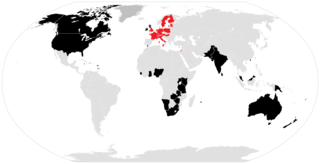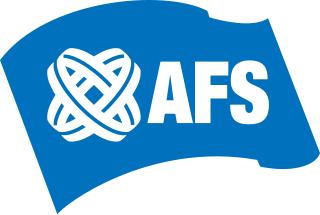The Fulbright Program, including the Fulbright–Hays Program, is one of several United States Cultural Exchange Programs whose goal is to improve intercultural relations, cultural diplomacy, and intercultural competence between the people of the United States and other countries through the exchange of persons, knowledge, and skills. It is one of the most prestigious and competitive fellowship programs in the world. Via the program, competitively-selected American citizens including students, scholars, teachers, professionals, scientists and artists may receive scholarships or grants to study, conduct research, teach, or exercise their talents abroad; and citizens of other countries may qualify to do the same in the United States of America. The program was founded by United States Senator J. William Fulbright in 1946 and is considered to be one of the most widely recognized and prestigious scholarships in the world. The program provides 8,000 grants annually.

The AEGEE, or Association des États Généraux des Étudiants de l'Europe, known as European Students' Forum in English, is the largest trans-national, interdisciplinary student organisation in Europe.

Erasmus Student Network (ESN) is a Europe-wide student organisation. Its goal is to support and develop student exchange on a local, national and international level. It is composed of around 13,500 members in over 530 local sections in 40 countries in Higher Education Institutions, including universities, polytechnics, and university colleges. The network offers its services to around 160,000 international students.

Service Civil International (SCI) is an international non-governmental voluntary service organisation and peace movement with 43 branches and groups worldwide. The organisation was founded in 1920 by Swiss engineer Pierre Cérésole. It is also known as International Voluntary Service in a number of English-speaking countries and as Voluntary Service International in Ireland.
The Studentenwerk or Studierendenwerk is a state-run non-profit organization for student affairs in Germany. Each Studentenwerk is organized at the local level so that it covers one or more universities. The umbrella organization for the 58 local Studentenwerke is the German National Association for Student Affairs, which was founded in 1921.

The Congress-Bundestag Youth Exchange is a youth student exchange program founded in 1983. The program, which is jointly sponsored by the United States Congress and the German Bundestag, funds exchange programs for German and American students through grants to private exchange organizations in both countries. The funding in the United States is administered by the Bureau of Educational and Cultural Affairs of the United States Department of State

Jeunesses Musicales International (JMI) is the largest youth music NGO in the world, created in Brussels, Belgium in 1945 with the mission to "enable young people to develop through music across all boundaries". JMI has established four priority activity fields: Young Musicians, Young Audiences, Youth Empowerment and Youth Orchestras & Ensembles. With member organisations currently in 45 countries and contact organisations in another 35, JMI is a “glocal” network with over 36,000 diverse musical events annually which embrace all styles of music, reaching almost 5 million young people up to the age of 30. The work of JMI is supported by the Federal Government of Belgium - BELSPO, ACTIRIS and the CREATIVE EUROPE Programme of the EU
Rachel Andresen was the founder of Youth For Understanding (YFU), a non-profit organization dedicated to international exchanges of high-school students.

EducationUSA is a U.S. Department of State network of over 400 international student advising centers in more than 170 countries. EducationUSA is officially a branch in the Office of Global Educational Programs in the Bureau of Educational and Cultural Affairs (ECA). ECA fosters mutual understanding between the United States and other countries by promoting personal, professional, and institutional ties between private citizens and organizations in the United States and abroad, as well as by presenting U.S. history, society, art and culture in all of its diversity to overseas audiences.
NAFSA: Association of International Educators is a non-profit professional organization for professionals in all areas of international education including education abroad advising and administration, international student advising, campus internationalization, admissions, outreach, overseas advising, and English as a Second Language (ESL) administration. As of 2010, it served approximately 10,000 educators worldwide, representing nearly 3,000 higher education institutions.

Youth for Exchange and Understanding (YEU) is an International Non-Governmental Non-profit Youth Organisation established in 1986 and member of the European Youth Forum in Brussels. YEU is recognized by the Council of Europe and the Directorate of Youth and Sports of the European Commission. YEU has its Head Office in Brussels, Belgium and a second office in Faro, Portugal from where it coordinates a network with more than 27 member organisations from Europe and North Africa. YEU is a non-profit International Youth Non Governmental Organization (IYNGO) independent of all political affiliation.

The World Assembly of Youth (WAY); French: Assemblée Mondiale de la Jeunesse, Spanish: Asamblea Mundial de la Juventud is the international coordinating body of national youth councils and national youth organisations. The full members of WAY are national youth councils. WAY currently has 140 member organisations from all continents. As the international coordinating body of national youth councils, WAY has consultative status 1 with the United Nations, the highest status possible for a non-governmental organization. WAY co-operates with the UN and many of its special agencies, particularly with UNAIDS, UNEP, ILO, UNESCO, UNFPA, UNICEF, UNDP, and WHO.
University Mobility in Asia and the Pacific (UMAP) is a voluntary regional association of government, non-government and/or university representatives of the higher education sector established in 1993 to enhance cooperation and exchange of people and expertise through increased mobility of higher education students and staff. UMAP has been endorsed by Asia-Pacific Economic Cooperation and member countries are implementing UMAP projects.
Regardless of political or religious convictions, the Arbeitskreis gemeinnütziger Jugendaustauschorganisationen (AJA) is the umbrella organisation of non-profit youth exchange organisations in Germany that engage in the promotion of long-term student exchange as a means for intercultural understanding. In IJAB, the German department of international youth work, AJA is the only organisation that represents long-term student exchange.
International Forestry Students’ Association or IFSA is a non-political, not for profit organisation of tertiary-level forestry students around the world. Approximately 10,000 forestry and related forest science students are either directly or indirectly represented, with about 75 Local Committees in over 40 countries.

NICE – Network of InterCultural Exchange is a German-Argentine cooperation, which applies itself to the educational and cultural exchange between Europe and Argentina. Its goal is to support students in organising long term stays in Argentina, to acquire among work experience Soft Skills as intercultural flexibility.

Johanniter International (JOIN) is an international network of charities affiliated to the Alliance of the Orders of Saint John of Jerusalem. Founded in 2000 and with headquarters in Brussels, Belgium, its 21 member organisations are located in Europe and the Middle East and focus on emergency rescue, health and social services, and international humanitarian assistance, amongst other aims. Together, the charities have a volunteer base of over 100,000 persons at their disposal. JOIN’s primary goal lies in facilitating exchange of best practices between its members, achieving closer cooperation among its members on the European and international level, and advocating the interests of its members on the European level.

AFS Intercultural Programs is an international youth exchange organization. It consists of over 50 independent, not-for-profit organizations, each with its own network of volunteers, professionally staffed offices, volunteer board of directors and website. In 2015, 12,578 students traveled abroad on an AFS cultural exchange program, between 99 countries. The U.S.-based partner, AFS-USA, sends more than 1,100 U.S. students abroad and places international students with more than 2,300 U.S. families each year. More than 424,000 people have gone abroad with AFS and over 100,000 former AFS students live in the U.S.
Virtual Exchange is a term used to describe "technology-enabled, sustained, people-to-people education programs" in which sustained communication and interaction takes place between individuals or groups who are geographically separated, with the support of educators and/or facilitators. This type of activity is most often situated in educational programs in order to increase mutual understanding, global citizenship, digital literacies, and language learning. Models of virtual exchange are also known as telecollaboration, online intercultural exchange, globally networked teaching and learning, collaborative online international learning (COIL). Non-profit organizations such as Soliya and the Sharing Perspectives Foundation have designed and implement virtual exchange programs in partnership with universities and youth organizations. In 2017 the European Commission published a feasibility study into virtual exchange and in 2018 the Erasmus+ Virtual Exchange project was launched in Europe and Southern Mediterranean countries.


















